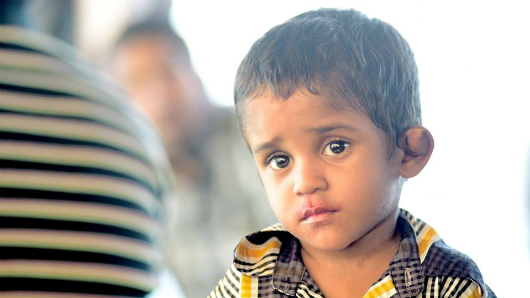Inter-generational violence and state negligence led to the abuse and death of three-year-old Mohamed Ibthihaal in January, police have said.
Chief Inspector Abdulla Satheeh said negligence by government authorities and the island community on Vaavu Rakeedhoo was partly responsible for the toddler’s murder.
“Investigating the death is not enough, wide investigation into circumstances surrounding his death is also important,” Satheeh told the press on Thursday.
Ibthihaal’s body was found with signs of severe abuse on January 28 in the worst case of child abuse in recent years. The murder shocked the nation while reports that officials had been aware of Ibthihaal’s abuse sparked public outrage.
The boy’s mother, Fathmath Afiya, was arrested for murder two days later and has since been held in remand detention.
Afiya’s stepfather, Ismail Raoof, was arrested on April 1 on suspicion of physically and sexually abusing Ibthihaal.
Satheeh said marks on the child’s neck indicated that he had been strangled.
Police also found swelling on the right side of his forehead, scrapes on his face, wounds on his right ear and scars all over his body. Some of his ribs were broken as well.
Satheeh said Ibthihaal’s death was caused by “major injuries” while some older scars remained unhealed.
“Mohamed Ibthihal had received physical and psychological harm from different individuals on different occasions, for a long period of time,” he said.
Police explained that Ibthihaal had been under the care of his maternal grandmother from the age of one and lived with her in Vaavu Keyodhoo and Meemu Madduvari.
Afiya’s stepfather is suspected of having abused Ibthihaal at the time.
Seven months before his death, Ibthihaal was brought back to Rakeedhoo to live with his mother, where his psychological and physical abuse continued.
Afiya had two other children at the time and is accused of mistreating Ibthihaal, neglecting to feed or wash the boy.
Satheeh said Afiya’s husband, Ibthihaal’s step father, took care of the boy.
On the day before his death, Afiya had not fed Ibthihaal after giving the boy a glass of juice. His stepfather fed him after coming home that night, Satheeh said.
Police suggested that Afiya’s anger towards her son stemmed from rumours surrounding his birth. Ibthihaal was reportedly born out of wedlock.
During her interrogation, Afiya confessed to severely beating Ibthihaal after waking up in the morning “because of the anger she had towards him”.
Afiya said she called for help when she saw no movement from the child.
Local media has reported that Afiya was also a victim of sexual abuse.
Afiya’s stepfather, Raoof, had previously been banished by the Vaavu Keyodhoo court after being found guilty of abusing a step-child. Afiya was reportedly the victim of the abuse.
Negligence
In its submission to the UN’s Universal Periodic Review, the human rights watchdog said children born out of wedlock face discrimination in the Maldives.
Illegitimate children were denied their father’s name, inheritance and child maintenance, the Human Rights Commission of the Maldives said.
The commission noted that the absence of requisite procedures, inconsistencies in institutional applications and lack of sensitivity among law enforcement and judiciary towards domestic violence are fundamental issues faced in implementation of Domestic Violence Act.
Limited capacity of investigators and their belief that such cases are family matters inhibit victims from getting redress.
“Reporting of domestic violence cases remain low as a result of lack of confidence in the system, fear of intimidation by perpetrators, stigmatisation and inadequate information on protection measures,” the commission stated.
“Violence against children takes place in all settings. Only a small proportion of reported child abuse victims gets justice and remains re‐victimised due to systemic failures.”
Likes (3)Dislikes
(3)Dislikes (0)
(0) 